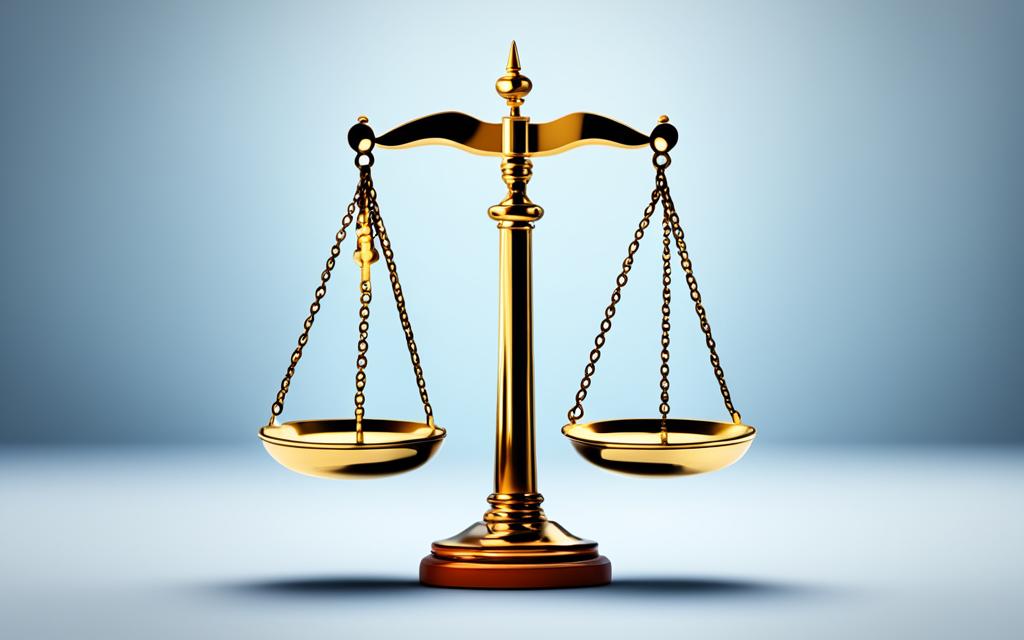Welcome to the first section of our comprehensive guide on operating a business in the Netherlands. In this article, we will provide you with valuable insights into the legal and regulatory requirements that companies must comply with in Dutch corporate operations. Understanding these Netherlands requirements is essential for ensuring a smooth and compliant business journey.
From business registration and formation to tax obligations, employment regulations, and intellectual property protection, we’ll cover all the key aspects that you need to know. We’ll also discuss data protection and privacy, as well as environmental regulations, enabling you to navigate the Dutch business landscape with confidence.
To kick off, let’s explore the legal and regulatory mandates that companies operating in the Netherlands must adhere to. These requirements serve as the foundation for establishing and running a successful business in this dynamic European market.
Now, let’s delve into the details of the legal requirements and regulations that are crucial for your business operations in the Netherlands.
Business Registration and Formation
Before starting a business in the Netherlands, it is important to understand the process of business registration and company formation. This section will outline the steps and requirements involved in setting up a company in the Netherlands, including types of business entities and registration procedures.
- Choosing the Right Business Entity: In the Netherlands, there are different types of business entities to choose from, such as sole proprietorships, partnerships, and limited liability companies. Each entity has its own advantages and requirements, so it’s crucial to carefully consider the nature and scope of your business before making a decision.
- Registering Your Business: Once you have chosen the appropriate business entity, you need to register your company with the relevant authorities. The Netherlands Chamber of Commerce (Kamer van Koophandel) is responsible for business registration and provides the necessary guidance and documentation.
- Important Documents: During the registration process, you will need to provide certain documents and information, such as identification, proof of address, articles of association, and a business plan. It is essential to ensure that all documents are complete and accurate to avoid any delays or complications.
- Fulfilling Legal Requirements: As part of the registration process, you will also need to fulfill various legal requirements, such as obtaining a Dutch fiscal number (BSN), registering for VAT (Value Added Tax), and complying with employment and insurance regulations if you plan to hire employees.
- Seeking Professional Assistance: Given the complexity of the registration and formation process, it is advisable to seek professional assistance from a Dutch legal expert or a business consultant who can provide guidance and help navigate the regulatory requirements.
By carefully following the business registration and formation process in the Netherlands, you can ensure that your company complies with all the necessary requirements and can operate legally and successfully in the Dutch market.
Tax Obligations and Accounting
Companies operating in the Netherlands are subject to tax obligations and accounting requirements. Understanding the tax system in the Netherlands is crucial for businesses to ensure compliance and manage their financial responsibilities effectively.
Tax System in the Netherlands
The Netherlands has a comprehensive tax system that includes various taxes applicable to businesses. The key taxes that companies need to consider are corporate income tax, value-added tax (VAT), and social security contributions.
Corporate income tax is imposed on the profits earned by companies in the Netherlands. It is important for businesses to accurately calculate and report their taxable income to fulfill their tax obligations.
VAT is a consumption tax that is applied to most goods and services provided by businesses. Companies are required to register for VAT, charge VAT on their sales, and submit regular VAT returns to the tax authorities.
In addition to income tax and VAT, businesses operating in the Netherlands must also contribute towards social security. These contributions go towards funding the Dutch social security system, which provides benefits such as healthcare, unemployment benefits, and pensions.
Accounting Standards and Reporting Obligations
Along with tax obligations, companies in the Netherlands must also adhere to accounting standards and reporting obligations. These requirements ensure that businesses maintain accurate financial records and provide relevant and reliable financial information to stakeholders.
The Dutch generally accepted accounting principles (GAAP) outline the rules and guidelines for financial reporting in the Netherlands. Companies need to prepare their financial statements in accordance with these standards, which include balance sheets, income statements, and cash flow statements.
Furthermore, companies may also need to comply with specific reporting obligations based on their size and legal structure. For instance, large companies are required to file annual reports with the Dutch Chamber of Commerce, which include financial information, management reports, and other relevant disclosures.
By fulfilling their tax obligations and complying with accounting standards, businesses can ensure transparency, maintain good financial standing, and avoid any legal or financial consequences.
Employment Regulations
Businesses operating in the Netherlands are required to comply with specific employment regulations. Familiarity with Dutch labor law is essential to ensure legal compliance and protect the rights of both employers and employees.
Key Aspects of Dutch Labor Law
Understanding the key aspects of Dutch labor law is crucial for businesses operating in the Netherlands. Here are some essential elements to consider:
- Employment Contracts: Companies must provide written employment contracts to their employees, containing important terms and conditions of employment.
- Working Hours: Dutch law sets limitations on maximum working hours and guarantees rest breaks for employees.
- Minimum Wage: Employers must ensure that their employees receive at least the minimum wage as set by the Dutch government.
- Holiday Entitlement: Employees are entitled to a minimum number of paid vacation days per year, as stipulated by law.
- Employee Rights: Dutch labor law grants various rights to employees, including protection against discrimination, termination of employment, and unfair treatment.
Obligations Related to Hiring Employees
In addition to the key aspects of labor law mentioned above, businesses in the Netherlands have certain obligations related to hiring employees. These include:
- Payroll Administration: Companies must ensure accurate payroll administration, including the proper withholding and payment of taxes and social security contributions.
- Social Security Contributions: Employers are responsible for deducting social security contributions from the salaries of their employees and remitting them to the relevant authorities.
Complying with employment regulations is essential for businesses in the Netherlands to maintain a harmonious working environment and avoid legal repercussions. By understanding and adhering to the requirements, companies can ensure fair treatment of their employees and build a solid foundation for their operations.
Intellectual Property Protection
Intellectual property protection is a vital aspect of doing business in the Netherlands. The country’s legal framework provides robust safeguards for various forms of intellectual property, including patents, trademarks, copyrights, and designs.
Obtaining proper protection for your intellectual property is essential to safeguard your business interests and maintain a competitive edge. Registering your patents, trademarks, and designs provides you with exclusive rights and legal recourse in case of infringement.
The Dutch patent system ensures that inventors and innovators have the opportunity to protect their inventions and benefit from their investment in research and development. By securing a patent, you gain exclusivity over your invention, preventing others from using, producing, or selling it without your permission.
Trademarks are valuable assets that help to distinguish your products or services from competitors. Registering a trademark in the Netherlands ensures that you have exclusive rights to use and protect your brand identity, preventing others from using similar marks or causing confusion in the market.
Copyright protection safeguards your creative works, such as literary, artistic, musical, or audiovisual creations. By registering your copyright, you establish ownership and have the right to control the reproduction, distribution, and public performance of your work.
Design protection is crucial for innovative product designs and shapes. Registering your design grants you the exclusive right to use and prevent others from copying or imitating your design, giving your business a competitive advantage.
It is important to consult with intellectual property experts and legal professionals to ensure compliance with Netherlands’ requirements and maximize the protection of your intellectual property assets.
Data Protection and Privacy
The Netherlands has specific regulations concerning data protection and privacy. Companies operating in the country must comply with these requirements to safeguard the personal information of individuals and ensure their privacy rights are respected.
One of the key regulations in the Netherlands is the General Data Protection Regulation (GDPR), which sets rules for the collection, processing, and storage of personal data. It applies to all businesses that deal with personal data, regardless of their size or industry.
Under the GDPR, companies are required to obtain consent from individuals before collecting their personal data. This includes information such as names, addresses, email addresses, and any other data that can be used to identify an individual. Companies need to clearly communicate the purposes for which the data is being collected and how it will be processed.
Furthermore, companies must ensure the security and confidentiality of the personal data they handle. This includes implementing appropriate technical and organizational measures to prevent unauthorized access, loss, alteration, or disclosure of personal information.
Individuals in the Netherlands have rights regarding their personal data. They have the right to access their data, request corrections or deletions, and object to the processing of their data for certain purposes. Companies are obligated to respond to these requests in a timely manner and provide individuals with necessary information.
The Dutch Data Protection Authority (Autoriteit Persoonsgegevens) is the regulatory body responsible for monitoring and enforcing data protection laws in the Netherlands. It has the power to investigate complaints, issue fines, and take legal action against companies that fail to comply with the regulations.
By complying with the data protection and privacy requirements in the Netherlands, companies can build trust with their customers and protect their reputation. It also ensures that individuals have control over their personal data and their privacy rights are respected.
Environmental Regulations
Businesses operating in the Netherlands have a responsibility to comply with environmental regulations to minimize their impact on the environment. These regulations aim to promote sustainable practices and protect the natural resources of the country. To ensure compliance and avoid penalties, companies need to be aware of the key environmental requirements and obtain the necessary permits.
One area of focus for businesses is waste management. The Netherlands has strict regulations regarding the disposal and treatment of waste. Companies must implement proper waste management practices, including recycling and responsible disposal methods. Obtaining the appropriate permits for waste processing facilities is also essential.
Effective emissions control is another crucial aspect of environmental regulations in the Netherlands. Companies are required to monitor and limit their emissions of pollutants such as greenhouse gases. This includes implementing technologies and practices to reduce emissions and adhere to emission standards set by the government.
Furthermore, energy efficiency is a significant consideration for businesses in the Netherlands. Companies are encouraged to adopt energy-efficient practices and technologies to reduce their carbon footprint. Compliance with energy efficiency requirements can result in cost savings and environmental benefits.














